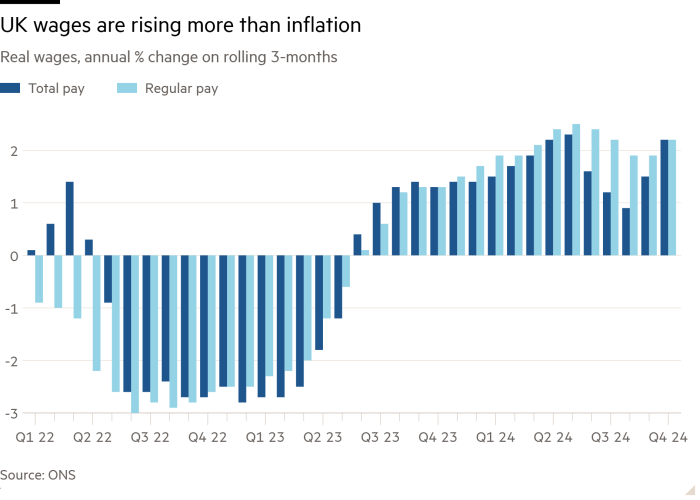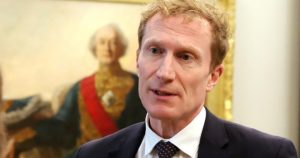Rachel Reeves heads into harsh 2025 as UK Budget damage reverberates

Rachel Reeves headed into the parliamentary Christmas break on Friday with more bad economic news on her desk, as data showed the UK public finances in the current fiscal year are worse than previously forecast.
Coupled with two consecutive months of economic contraction, resurgent inflation, a worse productivity problem than previously thought and falling business sentiment, the chancellor is set for a perilous 2025.
She is said by allies to be planning a big set-piece speech next month to show her determination to crank up growth. “I’m a fighter,” Reeves will say.
But almost six months into a Labour government whose central mission is growth, the economy has gone into reverse. Unless things pick up soon, the chancellor could face invidious fiscal choices, no matter how strong her fighting spirit.
“Much of the improvement in economic growth happened in the first half of the year and GDP growth has slowed ever since,” said Ruth Gregory, economist at research company Capital Economics. Momentum, she added, had “all but disappeared”.
A new forecast from the Bank of England on Thursday showed the UK is now set for zero per cent growth in the fourth quarter of the year, lower than the already puny 0.3 per cent it predicted last month.
The weaker growth outlook comes alongside government borrowing costs that are rising to levels last seen after then prime minister Liz Truss’s ill-fated “mini” Budget in 2022, increasing the danger that Reeves’ fiscal plans get derailed.
The yield on 30-year bonds climbed as high as 5.16 per cent on Friday — close to the highest this century — before falling back to 5.05 per cent. Yields move inversely to prices.
Reeves only left herself a £9.9bn fiscal margin against her key deficit rule in the Budget, which requires her to cover all day-to-day spending with tax receipts in 2029-30. Economists say that headroom is looking increasingly fragile heading into the new year.
Analysis by the Office for Budget Responsibility, the fiscal watchdog, showed the Treasury has overshot prior forecasts over the entire fiscal year to date, even though November’s borrowing came in under forecasts at £11.2bn.
The chancellor will give a spring statement on March 26 alongside a forecast by the OBR, with allies warning that she may have to squeeze public spending if her fiscal rules are broken.
Reeves last month told the CBI business group that she was “not coming back with more borrowing or more taxes”, but she is now careful not to exclude possible tax rises at the 2025 Autumn Budget or subsequent fiscal events.

In her first big speech of the year in January, Reeves will focus less on the tricky fiscal picture and instead will commit the Treasury to working relentlessly on cutting regulations, especially in eight key sectors.
She is said by colleagues to be “obsessed” at the way her Mansion House speech on November 14 provided a focal point for Treasury work on financial services regulation.
“She wants to have a series of ‘Mansion House-style’ events next year for different sectors, to provide a focus for identifying and removing barriers to growth,” said one ally.
Reeves is targeting sectors in the government’s industrial strategy: advanced manufacturing, clean energy, creative industries, defence, digital and tech, life sciences, and professional and business services.
She wants the Treasury to stop being a finance ministry, preparing Budgets, and focus on its growth role instead. The challenge is clear after labour productivity rose only 0.8 per cent since 2019, according to the latest estimates, lower than the 2 per cent previously reported. By comparison, the US registered an 8.3 per cent expansion over the same period.
“We will use the convening power of the Treasury,” said the Reeves ally. “She wants to get on with it. We’ve got the headwinds against us. There are challenging circumstances.”
Some of those difficult circumstances are of her own making. While Reeves vowed to end a decade of low growth with plans to “invest, invest, invest” in her October Budget speech, business sentiment wilted at her tax rises.
A report from the BoE’s network of regional agents this week found investment intentions were “subdued” because of a “general sense of uncertainty and caution”, with few references to the Budget having a direct impact on investment plans.
Instead, companies were anticipating a “substantial impact” on their costs from Reeves’ £25bn increase in employer national insurance contributions, the report said.
Some will respond by reducing headcount, cutting the working hours of their staff or investing more in automation, while others are considering offshoring labour, according to the report. While businesses expect a pickup in activity next year, they have recently become less confident about the prospects.
This does not mean the UK is wholly lacking in growth drivers for 2025. Household finances have improved throughout the year, which could tee up firmer consumer spending in the new year.
Wages have been growing faster than inflation for nearly one and a half years up to October. Household disposable income per capita in the second quarter, the latest available, matched the peak reached in 2021, before the cost of living crisis.
Many households also have also benefited from mortgage rates having come down from their summer 2023 peak.
Further cuts in official interest rates after two quarter-point reductions this year would help spur household and business spending, even if the timing of the BoE’s next move remains unclear given stubborn inflation.
Reeves’ boss, Sir Keir Starmer, urged MPs this week to be patient. “One of the biggest mistakes, I think, in the last 14 years was the idea that everything could be fixed by Christmas,” the prime minister said. “It can’t.”
#Rachel #Reeves #heads #harsh #Budget #damage #reverberates








